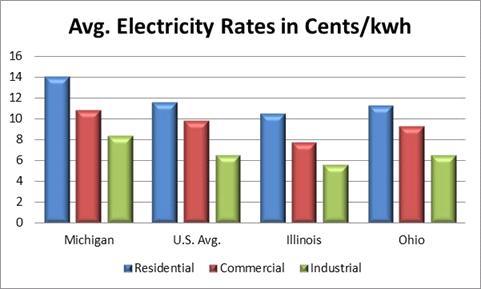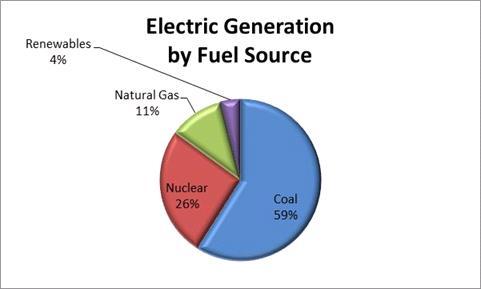Legislation proposed in Michigan for 2012 would have increased the ability of customers to choose an alternative energy provider, enabling Michigan businesses to use strategies to manage energy risks and remain competitive on a regional and national level. Nevertheless, this legislation failed to make it out of committee, a sign that Michigan’s failed attempt at deregulation will continue to damage the competitiveness of businesses in the state.
The following chart compares Michigan electric rates with the national average as well as 2 states in the Mid-West region where retail competition exists.

Source, EIA Table 5.6.A through December 2012
As the graphic illustrates, the rates paid by Michigan end-users are higher for residential, commercial and industrial customers than the average rate in the U.S. as well as the rates paid by end users in Illinois and Ohio, two states where electric deregulation has been much more robust and effective. These higher rates effectively reduce disposable income of residential customers and place extra strains on businesses that are competing against similar companies with lower energy costs, thereby damaging the Michigan economy.
Michigan’s 10% Rule
Although the state officially restructured its electricity market in 2000, there have been numerous changes to the legal and regulatory framework, the most important of which is a 2008 law that restricts the ability of Michigan consumers to choose their electricity provider. Under existing law, no more than 10% of the total electric sales in any electric utility’s service territory can be provided by a company other than the traditional utility. In 2008, there was very little effective competition in the energy industry and prices were low. The thinking at the time was that a 10% cap would never be reached, so that those customers who wanted to take advantage of the ability to proactively manage their energy risk would be able to do so. However, since then, there has been an increasing interest in retail electric choice in Michigan such that the choice programs are over-subscribed. Those customers who do not elect to take service from an alternative energy supplier or who cannot because the cap has been reached will be forced to stay with the utility on what is known as “default service”.
Under default service, the rate is re-set every year through a true-up proceeding, meaning that customers cannot engage in effective energy risk management because they cannot lock in a long term contract when prices drop during the year. Only those customers that are able to qualify as part of the 10% of the sales in each utility’s service territory can choose an alternative energy provider, enabling them to lock in longer term rates, allowing for increased budget certainty and pro-active energy risk management.
In March-2013, a poll from Energy Choice Now (http://www.ecnmichigan.com/index.asp), showed that more than 80% of Michigan likely voters favor electric deregulation in the state.
The future of Michigan’s electricity industry
With the failure of last year’s efforts to increase the ability of customers to choose their energy supplier by increasing the cap, the future looks bleak for effective energy risk management in Michigan. This picture is even bleaker once the fuel mix is considered.
Source: http://www.getenergyactive.org/fuel/state.htm.

There are several reasons why the fuel mix in Michigan is hampering the ability of end-users to lower their energy costs. Almost 60% of the generation is fired by coal. A recent raft of environmental regulations, including the Mercury Air Toxin Standards final rule approved by the EPA will make coal generation increasingly expensive as the tougher air standards require more environmental protections. These increased costs will be borne mostly by those clients on default service as the incumbent utility passes the costs of these environmental upgrades on to customers who do not have a choice in energy providers. In sum, the future for electricity consumers in Michigan looks like one of higher costs and the inability of all but the lucky few who can chose their energy provider to effectively manage their energy risk.
Conclusion
Michigan’s electric rates have increased sharply since 2008, and so has demand from Commercial and Industrial end users to return to a competitive market. Michigan electric rates are approximately 10% higher than the U.S. average. As rates have increased, the waiting list of potential customers shopping for electricity in the state has grown above 10,000, and support across political parties has also increased.
Copyright © 2013 Acclaim Energy Advisors. All content and functionality on the Site, including text, graphics, logos, icons, and images and the selection and arrangement thereof, is the exclusive property of Acclaim Energy Advisors or its licensors and is protected by U.S. and international copyright laws. All rights not expressly granted are reserved.


